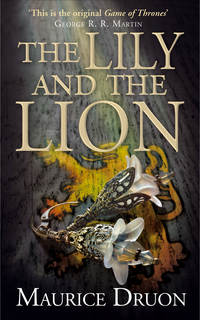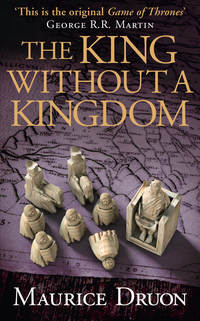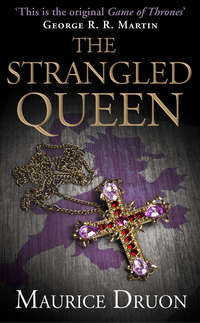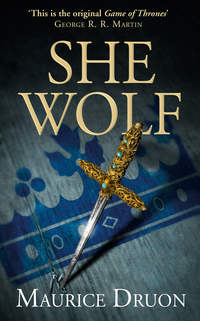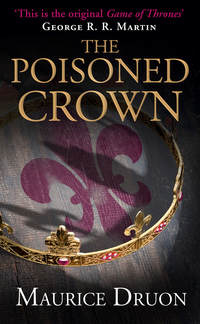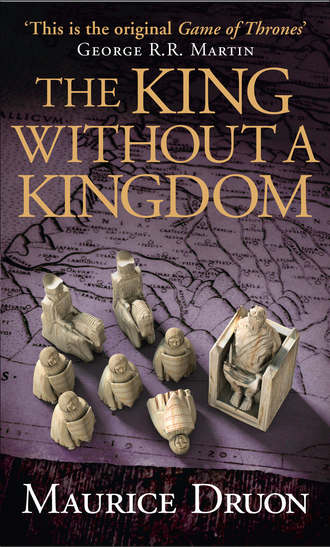
Полная версия
The King Without a Kingdom
It was also in Limoges that I began my studies in astrology. For this reason: the two sciences most necessary for the exercise of authority in government are indeed the science of law and the science of the stars. The former teaches us the laws that govern the relationships between men and the obligations they have towards each other, or with the kingdom, or with the Church, while the latter gives us knowledge of the laws that govern the relationships men have with Providence. The law and astrology; the laws of the earth, the laws of the heavens. I say that there is no denying it. God brings each of us into the world at the hour He so wishes, and this exact time is written on the celestial clock, which by His good grace, He has allowed us to read.
I know there are certain believers, wretched men, who deride astrology as a science because it abounds in charlatans and peddlers of lies. But that has always been the way; the old books tell us that paltry fortune-tellers and false wise men, hawking their predictions, were denounced by the ancient Romans and by the other ancient civilizations; that never stopped them seeking out the art of the good and the just observers of the celestial sphere, who often practised their skills in sacred places. Just so, it is not thought wise to close down all the churches because there exist simoniacal or intemperate priests.
I am so pleased to see that you share my opinions on this matter. It is the humble attitude proper for the Christian before the decrees of Our Lord, the Creator of all things, who stands behind the stars.
You would like to … but of course, my nephew, I will be delighted to do yours. Do you know your time of birth? Ah! That you will need to find out; send someone to your mother and ask her to give you the exact time of your first cry. Mothers remember such things.
As far as I am concerned, I have never received anything but praise for my practice of astral science. It enabled me to give useful advice to those princes who deigned to listen to me, and also to know the nature of any man I found myself up against and to be wary of those whose fate was adverse to mine. Thus I knew from the beginning that Capocci would be an opponent in all things, and I have always distrusted him. It is the stars that have guided me to the successful completion of a great many negotiations, and the making of as many favourable arrangements, such as the match for my sister in Durazzo, or the felicitous marriage of Louis of Sicily; and the grateful beneficiaries swelled my fortune accordingly. But first of all, it was to John XXII (may God preserve him; he was my benefactor) that this science was of the most invaluable service. Because Pope John himself was a great alchemist and astrologian; knowing of my devotion to the same art, and the distinction I had attained in it, impelled him to show increased favour for myself and inspired him to listen to the wishes of the King of France and make me cardinal at the age of thirty, which is a most unusual thing. And so I went to Avignon to receive my galero. You know how such a thing takes place. Don’t you?
The pope gives a grand banquet for the entrance of the new recruit to the Curia, to which he invites all the cardinals. At the end of the meal, the pope sits on his throne, poses the galero upon the head of the new cardinal, who remains kneeling and kisses first his foot, then his lips. I was too young for John XXII … he was eighty-seven at that time … to call me venerabilis frater; so he chose to address me with a dilectus filius. And before inviting me to stand up, he whispered in my ear: ‘Do you know how much your galero cost me? Six pounds, seven sols and ten deniers.’ It was in the way of that pontiff to humble you, precisely at that moment when you felt the most proud, always having a word of mockery for delusions of grandeur. Of all the days of my life there is not a single one of which I have kept a sharper memory. The Holy Father, all withered and wrinkled under his white zucchetto, which hugged his cheeks … It was the fourteenth of July of the year 1331 …
Brunet! Have them stop my palanquin! I am going to stretch my legs a little, with my nephew, while they brush off these crumbs. This is a flat stretch, and we are graced with a ray of sunlight, you will pick us up further on. Only twelve will escort me; I would like a little peace … Hail, Master Vigier … hail, Volnerio … hail, du Bousquet … may the peace of God be with you all, my sons, my good servants.
5
The Beginnings of the King they call The Good

KING JOHN’S BIRTH chart? Indeed, I know it; I have turned my attention to it on many an occasion … Had I foreseen it? Of course, I had foreseen everything; that is why I worked so hard to prevent this war, knowing full well that it would be disastrous for him, and consequently disastrous for France. But try and get a man to understand reason, particularly a king whose stars act as a barrier precisely to understanding and to reason itself!
At birth, King John II saw Saturn reach its highest point in the constellation of Aries, at the centre of the heavens. This is a dire configuration for a king, one that foretells deposed sovereigns, reigns that come to a natural end all too hastily or that tragic events cut short. Add to that, his moon rising in the sign of Cancer, itself lunar by nature, thus marking an overly feminine disposition. Finally, and to give you just the most striking features, the traits that are most obvious to any astrologer, there is a problematic grouping of the Sun, Mercury and Mars which are closely linked in Taurus. There you have a most threatening sky making up an unbalanced man, masculine and even of a thickset appearance, but for whom all that should be virile is as if castrated, up to and including understanding; at the same time a brutal and violent man, possessed by dreams and secret fears that provoke sudden and murderous fits of rage, incapable of listening to advice or of the slightest self-control, hiding his weaknesses under an exterior of grand ostentation; yet at the core, a fool, the exact opposite of a conqueror, his soul the opposite of the soul of a commander.
For certain people it would seem that defeat was their main preoccupation, they have a secret craving for it, and will not rest until they have found it. Defeat pleases the depths of their souls, the spleen of failure is their favourite beverage, as the mead of victory is to others; they long for subordination, and nothing suits them better than to contemplate themselves in a state of imposed submission. It is a great misfortune when such predispositions hang over the head of a king from the moment of his birth.
So long as John II had been Monseigneur of Normandy, living under the thumb of a father he didn’t care for, he had seemed an acceptable prince, and the ignorant believed his reign would be a happy one. For that matter, the people and even the court, forever inclined to succumb to delusion, always expect the new king to be better than his predecessor, as if novelty intrinsically carried miraculous virtue. No sooner did John have the sceptre in his hands than he began to show his true colours; the stars and his nature, in their unfortunate alliance, were bent on defeat.
He had only been king ten days when Monsieur of Spain, in the month of August 1350, was defeated at sea, off the coast of Winchelsea, by King Edward III. Charles of Spain was in command of a Castilian fleet, and our Sire John was not responsible for the expedition. However, since the victor was from England, and the vanquished a very close friend of the King of France, it was a poor start for the French monarch.
The coronation took place at the end of September. By then Monsieur of Spain had returned, and in Rheims they showed the vanquished man a good deal of sympathy, thus consoling him in his defeat.
In November the constable of France, Raoul II of Brienne, Count of Eu, returned to France. Though he had been taken prisoner four years earlier by King Edward, as a captive he had been free to do almost as he pleased, even to travel between the two countries, since he was involved in the negotiations for a peace treaty. We had been working very hard for this in Avignon and I myself had corresponded with the constable. On this occasion he had returned in order to raise money for his ransom payment. I certainly shouldn’t need to tell you that Raoul of Brienne was a high-ranking, great and powerful character, and one might say the second in command in the kingdom. He had taken over his father Raoul V’s charge, upon the latter’s death in a tournament. He held vast fiefs in Normandy, others in Touraine, including Bourgueil and Chinon, others in Burgundy, still others in Artois. He possessed land in England and in Ireland, but that was for the time being confiscated; he owned other land in the Barony of Vaud. He was the cousin by marriage of Count Amadeus of Savoy. Such a man one treats with a certain respect, when one has only just sat oneself upon the throne, wouldn’t you think, Archambaud? Well, our John II, after hurling furious but wholly unclear reproaches upon Raoul on the night of his arrival, immediately ordered that he be taken prisoner. And on the morning of the next day but one, had him decapitated, without trial … No; no grounds were given. We weren’t able to find out anything more, even at the Curia, no more than you heard in Périgueux. And yet, this was not for want of effort; certainly we went to great lengths to shed some light on the affair, believe me! To explain away this hasty execution, King John claimed to have in his possession written proof of the constable’s treachery; but he never produced it, never. Not even the pope, who urged him, in his own interests, to reveal the famous proof, was offered anything but stubborn silence.
It was then that the whispering began in all the courts of Europe, assumptions were made … The talk was of love letters that had fallen into the hands of the king upon the death of Madame Bonne of Luxembourg, love letters from the constable, to which his queen evidently had responded in kind … Ah! You too have heard this fable! A strange liaison indeed, and one where it is difficult to see any opportunity, in any event, for it to have taken a criminal turn, between a woman who was forever pregnant and a man who was almost constantly in jail for four long years! Perhaps there were some painful things for the king to read in the letters of Messire of Brienne; but if this were true, they would certainly concern his own behaviour and not that of Madame Bonne … No, nothing of any substance could have explained the execution, nothing except the new king’s murderous and hateful nature, somewhat akin to that of his mother, the lame and wicked one. The real motive was revealed shortly after, when the constable’s charge was passed on … you well know to whom … indeed! To Monsieur of Spain, with part of the deceased’s estate … all the land and possessions of Raoul of Brienne were shared out amongst the king’s closest friends and allies. That is when Count John of Artois obtained the County of Eu, a large part of the estate.
Such largesse makes fewer friends than it creates enemies. Messire of Brienne had any number of friends and relatives, vassals and servants; he had a whole circle of supporters who had been sincerely attached to him and instantly became a network of malcontents when he was beheaded. In addition to them, in the ranks of the alienated, we should include those of the royal entourage who received neither bread nor crumb of the spoils, and became bitter and jealous.
Ah! We have a good view from here of Châlus and its two castles. How beautifully those two tall keeps match each other, separated by such a slender stream! And the countryside is pleasant on the eye, under these fast-moving clouds …
La Rue! La Rue, if I am not mistaken; it was before the tower on the right, up on the hill, that Messire Richard the Lionheart was struck most sorely by an arrow that took his life? It is nothing new for the people of our country to be attacked by the Englishman, and to defend themselves …
No, La Rue, I am not at all tired; I am only stopping to admire the view … And I most certainly do walk at a brisk pace! I will walk on a little further, and my palanquin will pick me up ahead. We are in no particular hurry. If my memory serves me well there are fewer than nine leagues between Châlus and Limoges. Three and a half hours will suffice without straining the horses … So be it! Four hours. Let me enjoy these last days of fine weather that God has granted us. I will be long enough closed up behind my curtains when the rain comes …
So, I was telling you, Archambaud, how King John managed to make his first circle of enemies, at the heart of the kingdom itself. He resolved to make some friends, loyal supporters, men entirely devoted to him, tied to him by a new bond, who would help him in war as in peace, and who would cover his reign with glory. And to this end, at the dawn of the following year, he founded the Order of the Star, to which he gave the purpose of the raising of chivalry, the heightening of honour. This great novelty was, in fact, nothing new, as King Edward of England had already established the Garter. But King John laughed at this Order named for a trophy around a woman’s thigh. The Star would be something else altogether, quite other. There you can take note of one of John’s most predictable personality traits. He only knows how to copy, while always pretending to have thought it up himself.
Five hundred knights, no less, that were to swear on the Holy Scriptures to never retreat from the enemy, not one foot, and never to give themselves up. So much of the sublime needed to be signalled by visible signs. As far as ostentation was concerned, John II used all the means at his disposal; and funds began to leak from his already-compromised Treasury, like wine from a barrel full of holes. To lodge the Order he had the house of Saint-Ouen fitted out. From then on, the house was known only as the Noble House, a grand house fretted and sculpted, incrusted with ivory and other precious substances, filled with magnificent furniture. I myself have never seen the Noble House, but it has been described to me. Its walls are, or rather were, hung with gold and silver cloth, or with velvet sewn with gleaming stars and golden fleurs-de-lis. For each of his knights the king had made a coat of arms, white silk, a surcoat half white, half vermilion, a vermilion hood with a golden clasp in the shape of a star. They also received a white banner embroidered with stars, and all were presented with a heavy ring of gold and enamel, to show that they were all as if married to the king … which brought smiles to some lips. Five hundred clasps, five hundred banners, five hundred rings; just figure the expense! It would seem that the king designed and discussed each piece of this glorious paraphernalia. He really believed in his Order of the Star! With as mediocre stars as his, he would have been better advised to choose a different emblem altogether.
Once a year, according to the rule that he had himself drawn up, all knights were to meet up at a great feast, where each by turn would tell the story of his heroic deeds and the feats of arms he had accomplished over the year; two scribes would keep a register and chronicle. The Round Table would live again, and King John’s renown would surpass that of King Arthur of Britain! He developed projects as great as they were vague. There was once again talk of crusades …
The first Assembly of the Star, convened on the Day of the Kings, 1352, was somewhat disappointing. The valiant knights-to-be didn’t have many great exploits to tell of. Time had been too short for there to be Janissaries10 cleaved in two, from the helmet down to the tree of their saddles, or virgins delivered from barbaric jails; these would be tales for another year. The two scribes commissioned to take down the Order’s chronicles in 1352 had little use for ink, unless of course the drunkenness and debauchery manifested within the Noble House counted as an exploit. Because the Noble House was the scene of the biggest drinking binge seen in France since Dagobert. The knights in their white and vermilion threw themselves upon the feast with great abandon; before dessert they were shouting, singing, screaming, blind drunk, only leaving the table to piss or throw up, then back to pick from the dishes, challenge each other fervently as to who could empty the most flagons, deserving only to be appointed Knights of Revelry. The fine golden dishes, beautifully worked for them, were crumpled or broken; they threw them across the tables like children, or crushed them with their fists. The fine open-worked and embellished furniture was reduced to debris. Some in their drunken state seemed to believe that they were already at war, as they went about plundering the very house they were in. This was how the gold and silver cloth drapery hung on the walls was stolen.
And yet further disaster, on that same day the English seized the Citadel of Guines, which was delivered treacherously to them while the captain commanding that fortress was to be found feasting at Saint-Ouen.
The king was greatly vexed by all this and began to wallow in the idea that his greatest schemes were, by some terrible twist of fate, doomed to failure.
Shortly after came the first battle in which the Knights of the Star would take part, not in the far reaches of some imagined Orient, but in a wood in Lower Brittany. Fifteen of them, to prove that they were capable of great deeds other than drinking, respected their pledge to never back off and never retreat; and rather than pulling out while they could, as any sensible person would have done, they let themselves be encircled by an enemy whose numbers left them not the slightest chance. Not one of them returned to tell the tale. But the relatives of the dead knights didn’t hesitate to condemn the oath, and called into question the new king’s mental state, saying he must have a most disturbed mind to impose upon his bannerets such an insane oath, and if all of them were to abide by it, then he would soon be very much alone at his assembly in the Noble House …
Ah! Here comes my palanquin … Would you prefer to return to the saddle? I think I will sleep a little so as to be refreshed upon arrival … But you understand now, Archambaud, why the Order of the Star rapidly came to almost nothing, and was spoken of less and less as the years went by.
6
The Beginnings of the King they call The Bad

HAVE YOU NOTICED, my nephew, that wherever we stop for the night, be it at Limoges, Nontron or elsewhere, everyone asks us for news of the King of Navarre, as if our kingdom’s fate depended on this prince? In truth, the situation in which we find ourselves is a strange one indeed. The King of Navarre is being held prisoner in an Artois castle by his cousin the King of France. The King of France is in turn being held prisoner in a Bordeaux house by his cousin, the heir to the throne of England. The dauphin, heir to the French throne, struggles with his restless bourgeoisie and his remonstrating Estates-General in Paris. And yet it is the King of Navarre that everyone seems to be worrying about. You heard the bishop himself say: ‘They said that the dauphin was a great friend of Monseigneur of Navarre. Isn’t he going to release him?’ Good Lord! I sincerely hope not. This young man has been well advised to do nothing of the sort thus far. And I am concerned about that attempted escape that the knights of the Navarre clan put together to deliver their leader. It failed; of that we should be thankful. But there is good reason to believe that they will soon try again.
Yes, yes, I learned a good many things during our stay in Limoges. And I am preparing to write to the pope about them as soon as we arrive in La Péruse this evening. If it was pure stupidity on the part of King John to lock up his Monseigneur of Navarre, it would be more pure stupidity on the part of the dauphin to release him today. I know of no greater meddler than the Charles they call the Bad; and they certainly couldn’t have done better if they’d tried, King John and he, through their feud, to throw France into its current misfortune. Do you know where his name comes from? From the very first months of his reign. He lost no time at all in earning it.
His mother, Louis Hutin’s daughter, died, as I was telling you the other day, during the autumn of ’49. In the summer of 1350 Charles went to be crowned in his capital city of Pamplona, where he had never once set foot in all the eighteen years since his birth in Évreux. Wanting to make himself known, he travelled the length and breadth of his State, which required no great travelling, then he went to visit his neighbours and relations, his brother-in-law, the Count of Foix and of Béarn, the one who calls himself Phoebus, and his other brother-in-law, the King of Aragon, Peter the Ceremonious, and also the King of Castile.
Now, one day, back in Pamplona, he was crossing a bridge on horseback when he met a delegation of Navarrese noblemen who had come to the city to bring him their grievances, as he had allowed their rights and privileges to be flouted. When Charles refused to hear them, things began to get a little heated; the new king then ordered his soldiers to seize those who were shouting closest to him, and, saying that one must be prompt in dealing out punishment if one wishes to command respect, further ordered that they be hanged immediately on the trees nearby.
I have noticed that when a prince resorts to capital punishment too quickly he is often giving in to fits of panic. In this Charles was no exception, as I believe his words are braver than his deeds. These brutal hangings would plunge Navarre into mourning, and soon by common consent he had earned the right to be called el Malo by his subjects, the Bad. He didn’t delay in moving away from his kingdom, whose government he left to his youngest brother Louis, only fifteen at the time, preferring to return to the bustle of the French court accompanied by his other brother Philip.
So, you may say, how can the Navarrese contingent have become so powerful and thick on the ground when in Navarre itself the king is widely hated, and even opposed by many of the nobility? Heh! My nephew, it is because this contingent is mostly made up of Norman knights from the county of Évreux. And what really makes Charles of Navarre dangerous for the French crown, more than his possessions in the south of the kingdom, are the lands he holds, or that he held, near Paris, such as the seigniories of Mantes, Pacy, Meulan, or Nonancourt, which command access to the capital from the westerly quarter of the country.
That danger King John understood well, or was made to understand; and for once in his life he showed proof of some common sense, endeavouring to make amends and reach an understanding with his Navarrese cousin. By which bond could he best tie his cousin’s hands? By a marriage. And what marriage could one offer him that would bind him to the throne as tightly as the union that had, six months long, made his sister Blanche Queen of France? Why, marriage with the eldest of the daughters of the king himself, little Joan of Valois. She was only eight years old, but it was a match worth the wait before it could be consummated. For that matter, Charles of Navarre had no shortage of lady friends to help him bide his time. Amongst others a certain demoiselle11 Gracieuse … yes, that is her name, or the one she answers to … The bride, little Joan of Valois, was herself already a widow, as she had been married once before, at the age of three, to a relative of her mother’s that God wasn’t long in taking back.
In Avignon, we looked favourably upon this betrothal, which seemed to us a strong enough bond to secure peace. This was because the contract resolved all the outstanding business between the two branches of the French royal family. First of all, the matter of the Count of Angoulême, betrothed for such a long time already to Charles’s mother, in exchange for his relinquishing the counties of Brie and Champagne, and exchanging them in turn for Pontoise and Beaumont, but it was an arrangement that was never executed. In the new agreement, the initial agreement was reverted to; Navarre would get Angoumois as well as several major strongholds and castellanies12 that would make up the dowry. King John made a forthright show of his own power in showering his future son-in-law with gifts. ‘You shall have this, it is my will; I shall give you that, it is my word …’


